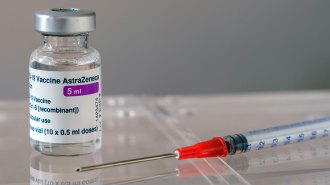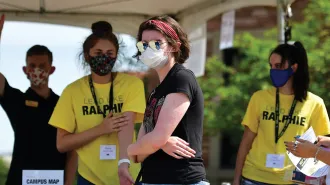Search Results
Why ask scientific questions?
Students will discuss the definition and importance of scientific questions, explore questions that scientists were able to investigate because of the coronavirus pandemic and brainstorm their own scientific questions.
- Exercise type:Activity
- Topic:Health & Medicine
- Category:Coronavirus
- Category:Data Analysis
- Category:Diversity in STEM
A fair shot
Students will analyze a graph to identify inequities in COVID-19 vaccine access among nations based on wealth, discuss how affluence affects access to and distribution of vaccines as well as how disparities in vaccine distribution affect global pandemic recovery. Students will then work in groups to research COVID-19 vaccine access and distribution in their state or local area, identify potential inequities in vaccine access and distribution and construct a graph of their own.
A century of science podcast
Using the Science News archive for reference, students will make a podcast detailing the developments in an area of science over the last century.

Vaccine Inequity Will Prolong Pandemic
In this guide, students will learn about challenges in vaccinating the world against COVID-19. Then, students will discuss the possible effects of varying vaccination rates on local and global scales.
Global problem solving gets personal
Students will think about how communities connect on local and global scales through the lens of COVID-19 vaccine distribution and consider why global collaboration in STEM is crucial for solving some large-scale issues.
Counting on COVID-19 vaccines
Students will answer questions about the online Science News article “Global inequity in COVID-19 vaccination is more than a moral problem,” which explores the scientific and economic impacts of the failure to fairly distribute vaccines globally. A version of the story, “Vaccine inequity will prolong pandemic,” appears in the March 27, 2021 issue of Science News.
Planning ahead to prevent future disasters
Students will take on the role of a planning board for a region identified as having an increased risk for natural hazards — wildfires, floods, droughts, heatwaves or hurricanes — due to climate change. After proposing regulations and other strategies to reduce the natural hazard’s impact, the students will discuss the merits of the proposed solutions before voting on a disaster plan and budget for their region.

Our Brains, Our Futures
In this guide, students will explore how brain science has progressed over the last century and how that progress could inform the field’s future. Then, students will discuss the ethics of advancements in neurotechnology.
Neuroscience fiction and fact
Students will answer questions about the online Science News article “Three visions of the future, inspired by neuroscience’s past and present,” which explores how advances in the field of neuroscience are bringing scientists closer to expanding, linking and healing human brains. A version of the story, “Our brains, our futures,” can be found in the March 13, 2021 issue of Science News.
Building better brains?
Students will explore advances in neurotechnology by making connections between examples they’ve seen in popular culture and what is currently possible. Students will then think critically about positive and negative effects of advancements in this area of science.

COVID-19 On Campus
In this guide, students will learn about strategies that five universities used to monitor coronavirus cases on campuses, analyze the strategies’ effectiveness at minimizing spread and reflect on the strategies used at their own school.
COVID-19 lessons for colleges
Students will explore and analyze various approaches some universities have taken to manage the COVID-19 pandemic on their campuses before comparing the strategies to those used at their own school.